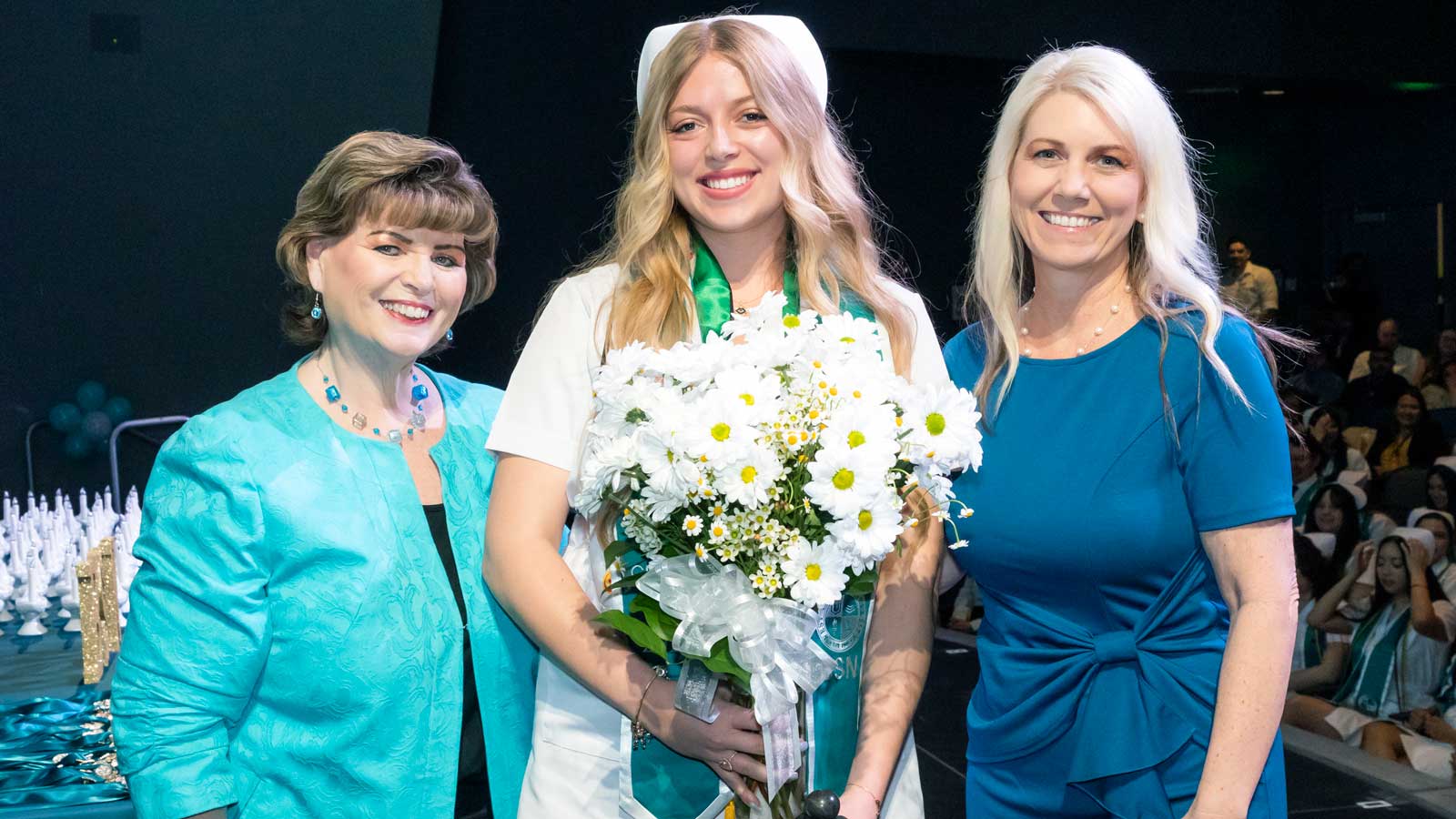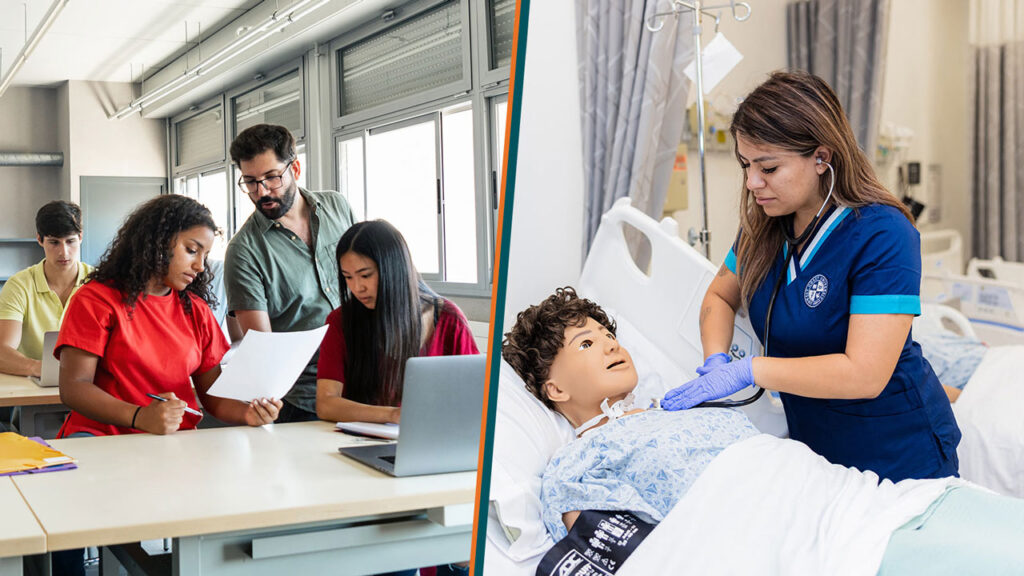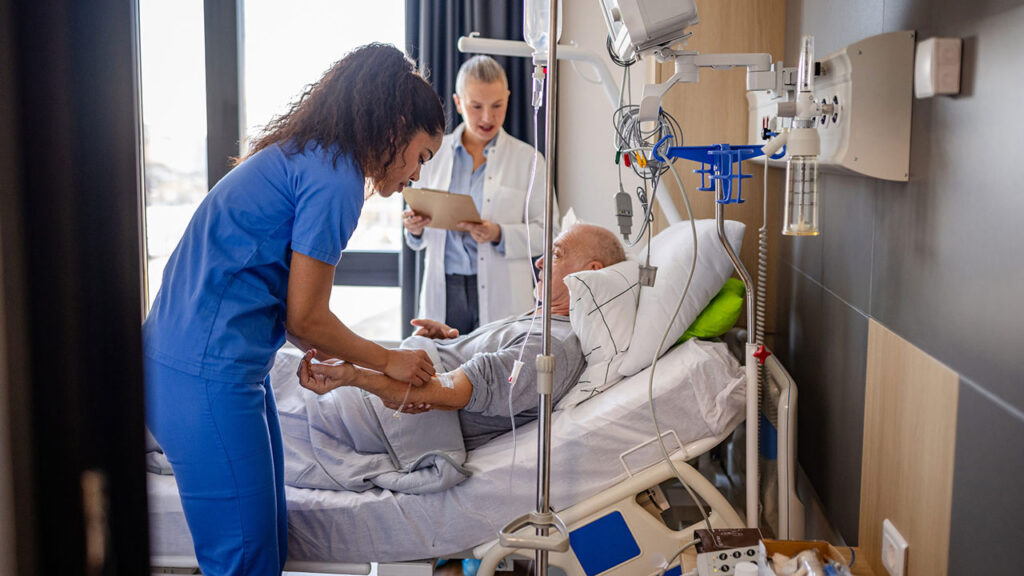West Coast University nursing graduate Maya S was recently honored with the DAISY-in-Training award for “displaying amazing compassion and kindness to a critically ill patient” during her clinical rotation.
Heavily medicated and in the intensive care unit, the patient had over a dozen key diagnoses which complicated his extreme illness — including multi-system organ failure. Each week when Maya and her classmates returned to the hospital, they were unsure if he would still be alive.
Student nurses are randomly assigned a different nurse each clinical visit, but for three weeks in a row Maya ended up shadowing the ICU nurse who was assigned to the patient. Despite his inability to speak due to a tracheostomy, Maya formed a deep connection with the patient, becoming his voice and advocate.
“Just as much as I played a part in his life, he played a huge part in mine because he was the first patient that I helped make a change in their life,” Maya said.
A patient’s voice
Unable to talk and too weak to write, the patient used simple hand gestures and thumbs-up or thumbs-down signals to respond to Maya’s questions.
“She always talked to him about every aspect of care being performed and encouraged him to try to talk or mouth words to express himself, when he was awake enough,” WCU-Orange County associate professor Ginger Pierson said, who nominated Maya for the DAISY Award.
Maya also spent time getting to know the patient on a personal level, engaging in “yes or no” conversations about sports and everyday life, as he raised a finger to indicate a favorite basketball team or player.
During ICU visiting hours, Maya also met the patient’s relatives and girlfriend, who she helped coach on ways to decipher what he was trying to say and tips on communicating with him. Through the family, Maya learned the patient was a sweet, friendly guy who loved to joke and have fun.
“They said he was a charmer and always had the biggest heart,” Maya said. “Can you imagine being so kind to everybody, and then it switches and you’re not even able to say anything?”
Sometimes, Maya said, the nurses would even entrust her to assist them with family updates due to her strong link to the patient’s relatives and her knowledge of the situation.
“I did get really attached because I felt so bad,” Maya said, “but my clinical instructor discussed with me that you need to learn how to create a bond, but to leave the attachment part outside.”
‘Let me choose’
On her last clinical shift in the ICU before a break in school, Maya noticed the patient was more awake and trying to get her attention. His health was declining, and the medical staff were on the phone with his mother, discussing his options. His mother, who lived out of state, wanted the tracheostomy to remain in place. Maya saw the patient disagreed.
“Let me choose,” he pled to Maya, which she relayed to the ICU staff.
At first the nurses and doctors weren’t confident Maya had understood him correctly, but quickly realized she was right.
“An active discussion then took place with the patient to hear his choices and a plan was made together, including waiting until the next day to see if the patient still felt the same way regarding his care,” Pierson said. “Because of Maya’s compassion and advocacy, this patient had a voice to make choices about his life and care.”
A self-confessed passionate person who “loves to cry,” Maya said she got emotional after her final visit with the patient. She knew the odds were against him and any improvement was unlikely. The next day, Maya said, in accordance with his wishes, the patient’s tracheostomy was removed.
A familiar voice
A few weeks later, Maya was back in the hospital when Professor Pierson asked if she could come into a patient’s room in the telemetry unit.
When Maya entered, sitting up in the bed, was her patient. In just a few weeks, he had made significant strides and regained the ability to move his arms, eat, drink water, and even text.
“He was texting!” Maya exclaimed with a laugh. “Before he couldn’t even put his thumb up! I was shocked!”
The patient had heard Maya’s voice outside his room, her instructor said, and wanted to meet her.
“He said, ‘You sound familiar. Why do you sound familiar?’’ and Maya explained that she had helped take care of him for a few weeks.
The patient was astonished that, even though he could not recall many other details from the previous month, he recognized something in Maya’s voice.
“I don’t remember certain things happening,” he said, “but I remember your voice.”
Lasting lesson
Reflecting on her experience, Maya said she learned that treating patients with respect and empowering them to make their own choices not only improved their quality of life but also enriched her own nursing practice.
“You have to care for them as much as you can because you don’t know what will happen,” she said.
Professor Pierson said she hoped Maya’s journey with the patient would serve as a reminder that behind every medical case is a person with hopes, dreams, and a desire for their voice to be heard.
“The way Maya handled herself with this patient with such compassion, confidence, and professionalism, and as a true patient advocate in the best way possible, was so impressive,” Pierson said. “This was truly a memorable nursing moment at its best.”
Daisy In-Training Award
The DAISY (Diseases Attacking the Immune System) Award is an international recognition program that honors and celebrates the skillful, compassionate care nurses provide every day. The DAISY Foundation was established by the family of Patrick Barnes after he died from complications of an autoimmune disease in 1999. During his hospitalization, the family deeply appreciated the care and compassion shown to Patrick and his entire family. When Patrick died, they felt compelled to say “thank you” to nurses in a very public way, and the Daisy Award was created to recognize those nurses who promoted the positive image of the nursing profession.
WCU provides career guidance and assistance but cannot guarantee employment. The views and opinions expressed are those of the individuals and do not necessarily reflect the beliefs or position of the school or of any instructor or student.



